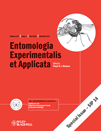
ENTOMOLOGIA EXPERIMENTALIS ET APPLICATA
Scope & Guideline
Innovating methodologies for impactful findings in entomology.
Introduction
Aims and Scopes
- Insect Ecology and Behavior:
Research focusing on the ecological interactions of insects within their habitats, including their behavior in response to environmental changes, host selection, and interactions with other species. - Biological Control and Pest Management:
Studies that explore the use of natural enemies, such as parasitoids and predators, as biological control agents to manage pest populations, including the effectiveness and ecological implications of these strategies. - Insect Physiology and Development:
Investigations into the physiological processes of insects, including life cycle dynamics, responses to environmental stressors, and adaptations to various ecological niches. - Chemical Ecology and Insect-Plant Interactions:
Research examining the chemical signals involved in insect-plant interactions, including host plant selection, herbivore-induced plant responses, and the role of semiochemicals in insect behavior. - Entomopathogenic Organisms and Microbial Control:
Studies that focus on the use of fungi, bacteria, and other microorganisms as biocontrol agents against insect pests, their mechanisms of action, and their effects on pest populations.
Trending and Emerging
- Impact of Climate Change on Insect Populations:
Research increasingly focuses on how climate change affects the distribution, behavior, and life history traits of various insect species, emphasizing the need for adaptive management strategies. - Insect-Plant Interactions and Agricultural Practices:
A growing body of work examines the complex interactions between insects and agricultural ecosystems, including the effects of crop management practices on pest dynamics and the role of biodiversity in pest suppression. - Microbial Control and Entomopathogenic Agents:
There is an increasing interest in the use of microbial agents for pest control, with studies exploring the efficacy, mechanisms of action, and ecological impacts of various entomopathogens. - Chemical Ecology and Insect Communication:
Emerging research is focusing on the chemical cues and signals that insects use for communication, host selection, and mating, reflecting a deeper understanding of ecological interactions. - Genomic and Molecular Approaches in Entomology:
The application of genomic tools and molecular techniques is on the rise, facilitating new insights into insect physiology, evolution, and interactions with pathogens and the environment.
Declining or Waning
- Traditional Insect Taxonomy:
Research focused on classical taxonomy and systematic studies of insect species has decreased as molecular techniques and genetic analyses become more prevalent and necessary for understanding biodiversity. - Insect Physiology Studies:
Although physiological studies are still relevant, there has been a noticeable decline in papers solely dedicated to traditional physiological aspects, with a shift towards integrating physiology with ecological and behavioral studies. - Insect Resistance Mechanisms:
While the study of pest resistance remains important, the specific focus on resistance mechanisms in isolation appears to be declining in favor of broader ecological and integrative approaches. - Descriptive Studies without Experimental Evidence:
There seems to be a decrease in purely descriptive studies that lack experimental manipulation or hypothesis testing, reflecting a trend towards more rigorous and experimental approaches in entomological research.
Similar Journals
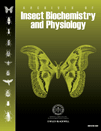
ARCHIVES OF INSECT BIOCHEMISTRY AND PHYSIOLOGY
Driving Innovation in Insect Research and ApplicationsArchives of Insect Biochemistry and Physiology, an esteemed journal published by WILEY, stands at the forefront of advancing the understanding of insect physiology and biochemistry. With an ISSN of 0739-4462 and E-ISSN of 1520-6327, this journal serves as a critical resource for researchers and professionals in the fields of biochemistry, insect science, and physiology. As of 2023, it holds a respectable impact factor with a Q3 ranking in Biochemistry and Physiology, and a Q2 in Insect Science, highlighting its relevant contributions to these disciplines. The journal has maintained a continuous publication history from 1983 to 2024, hosting pioneering research and review articles that inform both academic and practical applications in entomology. While it does not currently offer open access, it is accessible through various institutional subscriptions, ensuring widespread availability of essential findings. This journal plays a vital role in elucidating the complex biochemical pathways and physiological adaptations of insects, fostering knowledge that is crucial for ecological research, agricultural development, and conservation efforts.
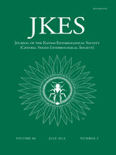
JOURNAL OF THE KANSAS ENTOMOLOGICAL SOCIETY
Fostering a Community of Entomological ExcellenceJOURNAL OF THE KANSAS ENTOMOLOGICAL SOCIETY, published by the Kansas Entomological Society, serves as a vital platform dedicated to the field of entomology and insect science. With an ISSN of 0022-8567 and an E-ISSN of 1937-2353, this journal has established itself since its inception in 1994, continuing to contribute valuable research up to 2024. Despite its current Q4 categorization in the 2023 Insect Science rankings, it ranks 106 out of 181 in Scopus, representing a significant opportunity for researchers to disseminate their findings in a supportive and engaged community. Although it is not an open-access journal, its commitment to rigorous peer review and relevance in agricultural and biological sciences makes it an essential resource for professionals, scholars, and students alike. The journal's focus on local and regional entomological issues often addresses broader ecological impacts, showcasing the importance of insects in environmental health and agriculture. We invite you to explore the rich tapestry of findings and discussions within this esteemed publication.
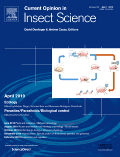
Current Opinion in Insect Science
Illuminating the World of Insect ResearchCurrent Opinion in Insect Science is a leading academic journal published by ELSEVIER, dedicated to advancing understanding in the field of insect science. With an impressive impact factor reflected in its top quartile rankings (Q1) within both Ecology, Evolution, Behavior and Systematics and Insect Science, the journal holds a prominent position, ranking 3rd out of 181 journals in Insect Science and 35th out of 721 in Ecology-related fields according to Scopus for 2023. Since its inception in 2014, the journal has provided a dynamic platform for researchers, professionals, and students to explore and share cutting-edge developments and insights, targeting crucial topics in insect biology, ecology, and systematics. Although there are no open access options available, Current Opinion in Insect Science remains an essential resource for those looking to stay at the forefront of their research or academic interests.
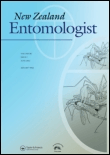
NEW ZEALAND ENTOMOLOGIST
Unveiling the Secrets of Insect Biology and EcologyNEW ZEALAND ENTOMOLOGIST, published by Taylor & Francis Ltd, is a distinguished journal in the field of Insect Science, featuring a rich history dating back to its initial publication in 1952. As a platform for sharing innovative research and critical insights, this journal serves as a vital resource for entomologists and scientists interested in the diverse aspects of insect biology, ecology, and behavior. Although it currently holds a Q4 category in its discipline with Scopus ranking it at the 163rd out of 181 journals, the NEW ZEALAND ENTOMOLOGIST continues to uphold high-quality standards of peer-reviewed articles that contribute significantly to the understanding of insects, particularly within the unique ecosystems of New Zealand. Researchers and professionals are encouraged to submit their findings to enhance the journal's growing repository of knowledge, while students will find a wealth of information to aid their studies and foster their interest in entomological research.
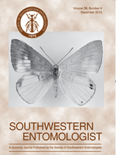
SOUTHWESTERN ENTOMOLOGIST
Innovating Solutions through Entomological ResearchSOUTHWESTERN ENTOMOLOGIST is a pivotal academic journal dedicated to advancing the fields of Agronomy, Ecology, and Insect Science. Published by the SOUTHWESTERN ENTOMOLOGICAL SOC in the United States, this journal plays a crucial role in disseminating vital research findings that address pressing ecological and agricultural challenges. With its ISSN 0147-1724 and E-ISSN 2162-2647, the journal has been publishing comprehensive studies since 1993 and continues to contribute significantly to the knowledge base up to 2024. As a Q4 ranked journal in both Agronomy and Crop Science and Ecology, as well as Insect Science, it provides an inclusive platform for researchers and students to share their insights and foster collaborations. Although it currently does not offer open access options, the content is accessible to academic institutions and professionals, ensuring that significant findings reach a broad audience. Given its niche focus, SOUTHWESTERN ENTOMOLOGIST not only appeals to researchers and students but also to professionals looking to stay updated on the latest trends and developments in entomology and its related fields.
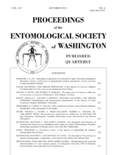
PROCEEDINGS OF THE ENTOMOLOGICAL SOCIETY OF WASHINGTON
Fostering Innovative Research in EntomologyProceedings of the Entomological Society of Washington is a distinguished journal dedicated to the field of entomology, published by the Entomological Society of Washington. With a rich history dating back to 1981 and a commitment to fostering scientific discourse, this journal serves as a vital platform for researchers and professionals specializing in insect science and ecology. It holds a respectable<> impact factor and is categorized in the Q3 quartile in both Ecology, Evolution, Behavior and Systematics and Insect Science, indicating its relevance within the scientific community. Although it does not offer open access, it provides a curated selection of high-quality research articles that significantly contribute to the understanding of insect biology, behavior, and taxonomy. The journal aims to bridge gaps in current research and inspire innovations in entomological studies, making it an essential resource for students, researchers, and practitioners in the field.
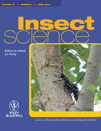
Insect Science
Exploring the intricate roles of insects in agriculture and ecology.Insect Science, published by WILEY, stands as a prestigious journal in the realms of Agronomy, Biochemistry, Genetics, and Insect Ecology. The journal, with ISSN 1672-9609 and E-ISSN 1744-7917, has firmly established itself as a significant resource for researchers and professionals seeking to explore the intricate dynamics of insects and their crucial roles in ecosystems. With a remarkable impact factor placing it in the Q1 quartile across multiple categories, including Ecology and Evolution and Agronomy and Crop Science, Insect Science ranks impressively at #8 out of 181 in the realm of Insect Science on Scopus, showcasing its influence and relevance in the field. Spanning its coverage from 1994 to 2024, this journal invites contributions that advance our understanding of insect biology, behavior, and their interactions within agricultural contexts. The commitment to high-quality research and its role in fostering interdisciplinary dialogue make Insect Science an essential platform for scholars and practitioners at the forefront of insect-related studies.

Frontiers in Insect Science
Unleashing Knowledge for Sustainable Insect ManagementFrontiers in Insect Science is a pioneering open-access journal dedicated to the advancement of knowledge in the field of insect science. Published by FRONTIERS MEDIA SA in Switzerland, this journal serves as a vital platform for researchers, professionals, and students to disseminate high-quality, peer-reviewed research spanning diverse topics within insect biology, ecology, and pest management. Since its establishment in 2021, the journal has gained recognition, ranking in the Q2 category of Insect Science with a Scopus ranking of #92 out of 181 in the field. With a commitment to promoting open access and collaboration, Frontiers in Insect Science is instrumental in fostering innovative research and practical applications essential for combating biodiversity loss and enhancing agricultural sustainability. As a freely accessible resource, it invites contributions that impact both fundamental and applied insect research, connecting a global network of scholars eager to explore the fascinating world of insects.
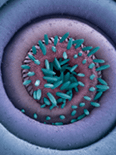
Annual Review of Entomology
Connecting Research, Policy, and Education in EntomologyAnnual Review of Entomology, published by Annual Reviews, is a premier journal dedicated to advancing the understanding of entomology through comprehensive review articles from leaders in the field. With a focus on Ecology, Evolution, Behavior, and Systematics and Insect Science, the journal ranks in the top quartile (Q1) as of 2023, reflecting its significant impact and relevance in these disciplines. Based in the United States, the Annual Review of Entomology has been a trusted resource since its inception, providing critical insights that inform research, policy, and education in entomology. Researchers and professionals will find valuable reviews that synthesize current knowledge and highlight future directions in insect research. The journal's impressive standing, as indicated by its rankings—first in both Agricultural and Biological Sciences categories—emphasizes its pivotal role in shaping scientific discourse and innovation.
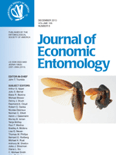
JOURNAL OF ECONOMIC ENTOMOLOGY
Fostering Interdisciplinary Dialogue on Insect ImpactJOURNAL OF ECONOMIC ENTOMOLOGY, published by OXFORD UNIV PRESS INC, stands as a premier interdisciplinary platform for researchers and professionals in the realms of entomology and ecological sciences. With a robust publication history dating back to 1945, this esteemed journal has consistently maintained its reputation for disseminating high-quality research, as evidenced by its prestigious Q1 rankings in both Ecology and Insect Science for 2023. The journal’s impact is highlighted by its excellent Scopus ranks, placing it in the top percentile of Agricultural and Biological Sciences and Environmental Science categories. Aimed at advancing the understanding of insects and their relationships with humans and ecosystems, the JOURNAL OF ECONOMIC ENTOMOLOGY offers a critical forum for original research articles, reviews, and opinion pieces that influence practices in pest management, conservation, and agricultural productivity. Although not an Open Access journal, its findings are pivotal for students, researchers, and professionals striving to address contemporary challenges in entomology and beyond.